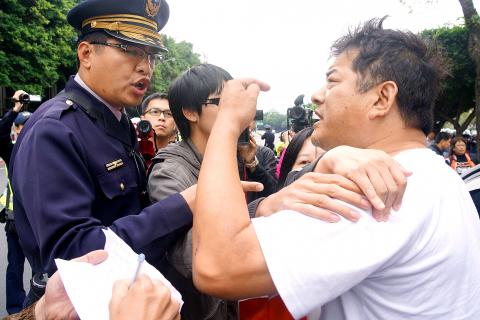Residents of Taipei’s Huaguang (華光) community gathered in front of the Ministry of Justice in the capital yesterday, bringing along rubble to protest against the ministry’s forced demolition of their homes.
The controversy over the land on which the community stands began in 2006 after a project to transform it into one of the four economic and digital technology centers was unveiled.
In 2009, the area was rezoned as a commercial rather than residential area.

Photo: CNA
Last year, the Executive Yuan approved plans to remodel the area into a “second Roppongi district” — a district in Tokyo famed for its nightclubs — and officials began measuring all the buildings in the designated area in November.
Although the Executive Yuan initially intended to demolish the entire area before Dec. 31, then-Executive Yuan secretary-general Steven Chen (陳士魁) decided that the project overlapped with urban renewal projects and turned over the remodeling of the area to the Construction and Planning Administration.
Located close to the Chiang Kai-shek Memorial Hall and spanning 11 hectares of land, the community — where the demolition of buildings was scheduled to begin yesterday — has been home to soldiers and their famlilies who were unable to obtain living quarters after the Chinese Nationalist Party (KMT) relocated to Taiwan in 1949.
Following the first wave of demolitions last month, during which seven buildings were bulldozed, the ministry demolished two more buildings on Hangzhou Road yesterday.
About 30 residents and their supporters placed pieces of a demolished wall and other rubble in front of the Ministry of Justice in protest.
Police warnings that they would remove the rubble sparked outrage among the residents, who said the government was now trying to take even the rubble after it had already robbed them of their homes.
Wearing white shirts printed with blood stains, the residents lay on the ground in protest, accusing the ministry of violating their human rights and attempting to manipulate the judicial system to force them into a tight corner.
The residents left the site after calling for the demolition to be halted until the government comes up with an acceptable relocation plan, punctuating their last call with a rush at police guarding the ministry.
Meanwhile, ministry official Yang Ho-chin (楊合進) said that the government was executing its legal duty to demolish the properties before turning the land over to the Ministry of Finance.
Legally, the justice ministry cannot delay the demolition process, Yang said, adding that the Taipei City Government had agreed to provide 57 public housing units to help with the relocation of Huaguang community residents.
The Ministry of Justice planned to meet with community residents to discuss the issue yesterday, but the residents said that as they had not received any formal notification from the government about the meeting they refused to attend.

Taiwan is to commence mass production of the Tien Kung (天弓, “Sky Bow”) III, IV and V missiles by the second quarter of this year if the legislature approves the government’s NT$1.25 trillion (US$39.78 billion) special defense budget, an official said yesterday. Commenting on condition of anonymity, a defense official with knowledge of the matter said that the advanced systems are expected to provide crucial capabilities against ballistic and cruise missiles for the proposed “T-Dome,” an advanced, multi-layered air defense network. The Tien Kung III is an air defense missile with a maximum interception altitude of 35km. The Tien Kung IV and V

The disruption of 941 flights in and out of Taiwan due to China’s large-scale military exercises was no accident, but rather the result of a “quasi-blockade” used to simulate creating the air and sea routes needed for an amphibious landing, a military expert said. The disruptions occurred on Tuesday and lasted about 10 hours as China conducted live-fire drills in the Taiwan Strait. The Civil Aviation Administration (CAA) said the exercises affected 857 international flights and 84 domestic flights, affecting more than 100,000 travelers. Su Tzu-yun (蘇紫雲), a research fellow at the government-sponsored Institute for National Defense and Security Research, said the air

Taiwan lacks effective and cost-efficient armaments to intercept rockets, making the planned “T-Dome” interception system necessary, two experts said on Tuesday. The concerns were raised after China’s military fired two waves of rockets during live-fire drills around Taiwan on Tuesday, part of two-day exercises code-named “Justice Mission 2025.” The first wave involved 17 rockets launched at 9am from Pingtan in China’s Fujian Province, according to Lieutenant General Hsieh Jih-sheng (謝日升) of the Office of the Deputy Chief of the General Staff for Intelligence at the Ministry of National Defense. Those rockets landed 70 nautical miles (129.6km) northeast of Keelung without flying over Taiwan,

A strong continental cold air mass is to bring pollutants to Taiwan from tomorrow, the Ministry of Environment said today, as it issued an “orange” air quality alert for most of the country. All of Taiwan except for Hualien and Taitung counties is to be under an “orange” air quality alert tomorrow, indicating air quality that is unhealthy for sensitive groups. In China, areas from Shandong to Shanghai have been enveloped in haze since Saturday, the ministry said in a news release. Yesterday, hourly concentrations of PM2.5 in these areas ranged from 65 to 160 micrograms per cubic meter (mg/m³), and pollutants were